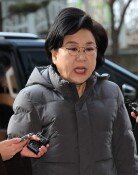[Editorial] Slogans Wont Fix Economy
[Editorial] Slogans Wont Fix Economy
Posted July. 11, 2006 03:25,
Uri Party Policy Committee Chairman Kang Bong-Kyun said bluntly in an interview, Distribution and everything else, the great discourse is all rubbish. He said so while explaining the background of what turned the economic management direction of the Uri Party, which was swept in the May 31 local elections, from welfare and solving bipolarization to reviving the economy. He mentioned that the government, the ruling party, and Cheong Wa Dae would coordinate to do so, and that is their introspection after the loss in the local elections, but we should keep an eye on them.
All previous administrations have shouted for welfare and distribution, but none as much as the Roh Moo-hyun administration. Whenever President Roh argued to increase the public servants, and increase taxes or budget, he always brought up welfare. At a government ceremony in April, he said, We will achieve the two goals of growth and distribution through reforms, but low-growth still prevails and improvements in welfare are not apparent as he claims. Although achieving the two goals of growth and distribution through reforms sounds nice, it is far from reality, so what good is it? Not everyone can become a singer just because they sing a song with pretty lyrics.
Chairman Kangs criticism on the great discourse or slogan economy of President Rohs administration is too belated. What were the so-called pragmatic ruling party lawmakers such as Chairman Kang doing when controversies over growth and distribution, tax cuts and hikes, and real estate tax bombs were being waged? It would have been right for them, who enjoyed all the privileges as high-ranking officials and big corporation CEOs, to scold the 386-generation that only knows how to cry for political activist style reforms, and raise questions to the governments same-code policy.
Their belated introspection after losing the elections is also unreliable. The Uri Party appeared to be intending to add significant changes to the Comprehensive Real Estate Law, which is of a penalty nature, and other laws, but changed its mind once again. Chairman Kang also knew well about such problem and backed off, saying, If it is amended, the original purpose of the policy will be weakened, and since it only affects two percent of the entire population, we decided to keep it as it is.
It is regretful that people such as Chairman Kang, who have rich experience in economic policy management, merely play the role of the ruling partys presidential election policy announcer. They should provide market-friendly, life quality-recovering policies, as well as policies that invigorate the private sector, not ones aimed for the next elections. It is also important for the governments economy team to be newly launched to assist the government in breaking away from failed policies.







